Mental fatigue can significantly hinder athletic performance, affecting focus and energy levels. This article explores the causes of mental fatigue, including stress and inadequate recovery. It discusses effective strategies such as mindfulness, structured rest, and cognitive behavioural techniques to enhance recovery. Additionally, it highlights unique methods like nature immersion and creative expression that can promote mental clarity and resilience.
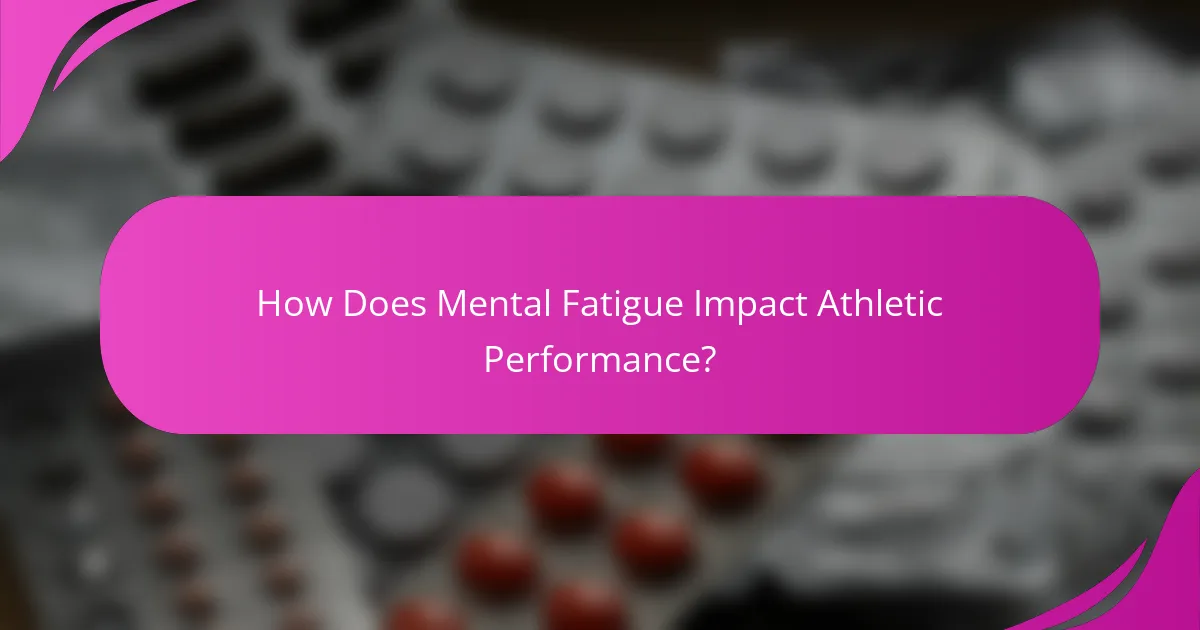
How Does Mental Fatigue Impact Athletic Performance?
Mental fatigue significantly impairs athletic performance by reducing focus, motivation, and overall energy levels. Athletes experiencing mental fatigue may struggle with decision-making, coordination, and endurance. Research indicates that mental fatigue can decrease physical performance by up to 20%. Effective recovery strategies, such as mindfulness and adequate rest, can mitigate these effects and enhance performance.
What are the signs and symptoms of mental fatigue in athletes?
Mental fatigue in athletes manifests through various signs and symptoms, including decreased motivation, irritability, and difficulty concentrating. Other indicators include fatigue despite adequate rest, lack of enthusiasm for training, and physical symptoms like headaches or muscle tension. Recognising these signs early can help in managing recovery effectively.
How does mental fatigue differ from physical fatigue?
Mental fatigue differs from physical fatigue primarily in its origin and effects. Mental fatigue stems from cognitive exertion, affecting focus and decision-making, while physical fatigue arises from physical activity, impacting strength and endurance. Mental fatigue can hinder performance in sports by reducing motivation and mental clarity, which are crucial for optimal athletic recovery. In contrast, physical fatigue is often alleviated through rest and nutrition, enabling the body to recover physically. Understanding these differences is essential for athletes to develop effective recovery strategies that address both mental and physical aspects.
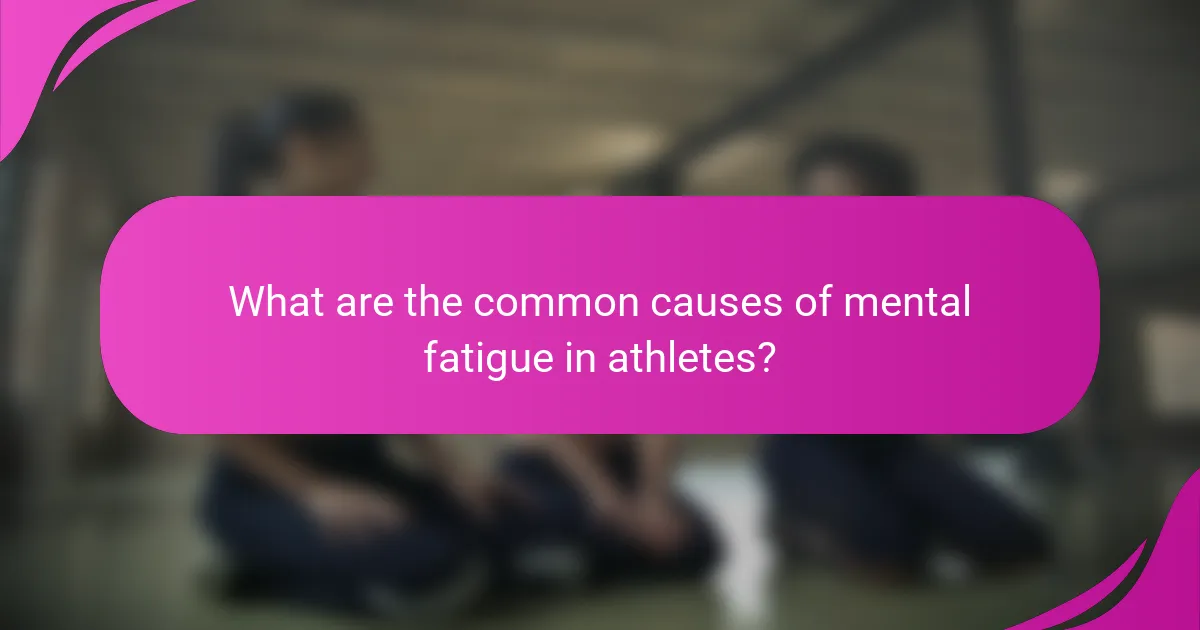
What are the common causes of mental fatigue in athletes?
Mental fatigue in athletes often stems from several common causes. These include intense physical training, psychological stress, lack of sleep, inadequate nutrition, and burnout. Prolonged training without adequate recovery can lead to diminished performance and mental exhaustion. Stress from competition or personal life can further exacerbate mental fatigue. Sleep deprivation negatively impacts cognitive function and recovery. Poor nutrition deprives the body of essential nutrients, hindering both physical and mental performance. Lastly, burnout results from chronic stress and overtraining, leading to a significant decline in motivation and mental clarity.
How do training volume and intensity contribute to mental fatigue?
Training volume and intensity significantly impact mental fatigue during athletic recovery. High training volume can lead to increased physical stress, which may exacerbate mental fatigue. Intensity dictates the effort level; greater intensity often correlates with heightened psychological strain. Athletes should balance these factors to optimise recovery and maintain mental resilience. Overtraining can lead to chronic fatigue, emphasising the need for structured training plans. Monitoring both volume and intensity helps in managing mental fatigue effectively.
What role does competition stress play in mental fatigue?
Competition stress significantly contributes to mental fatigue in athletes. It can lead to decreased focus, reduced motivation, and impaired recovery. High-pressure situations often trigger anxiety, which exacerbates feelings of exhaustion. Studies show that managing competition stress through techniques like mindfulness can enhance mental resilience and recovery. Understanding this relationship is crucial for athletes seeking to optimise their performance and well-being.
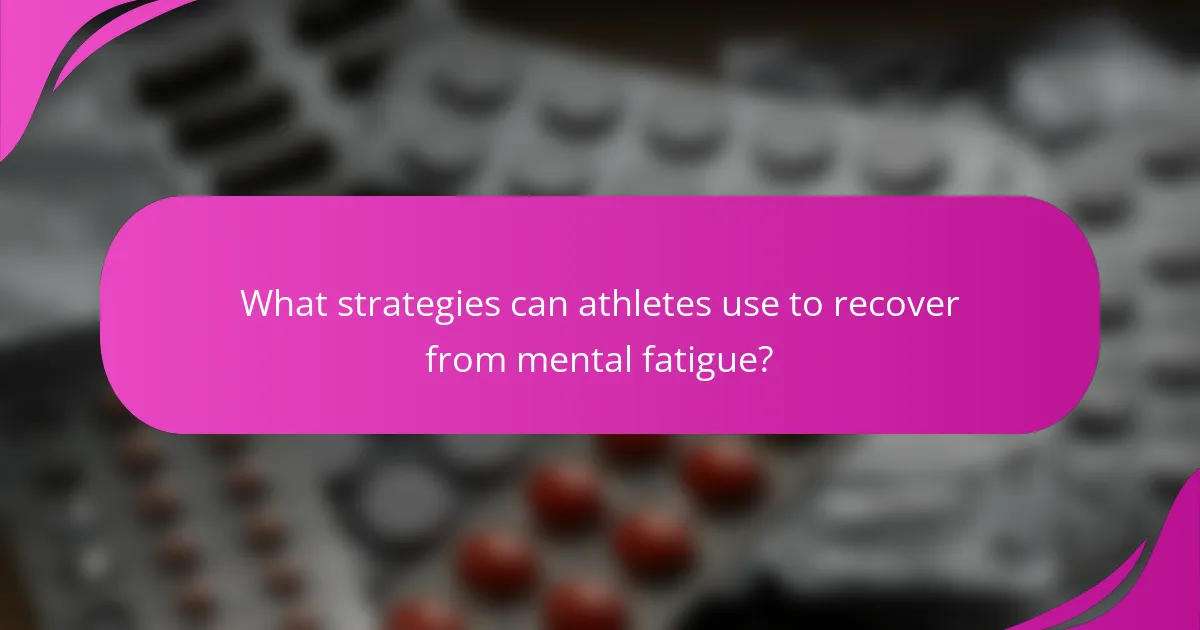
What strategies can athletes use to recover from mental fatigue?
Athletes can combat mental fatigue through strategies like mindfulness, structured rest, and goal setting. Mindfulness techniques enhance focus and reduce stress, while scheduled rest prevents burnout. Setting achievable goals fosters motivation and a sense of accomplishment.
How can proper rest and sleep improve recovery?
Proper rest and sleep significantly enhance recovery by allowing the body to repair and rejuvenate. Quality sleep contributes to muscle recovery, hormone regulation, and mental clarity, which are essential for athletes. During deep sleep, growth hormone levels peak, facilitating tissue repair and muscle growth. Additionally, adequate rest reduces the risk of injuries by improving focus and reaction times. Prioritising sleep can lead to better overall performance and resilience against mental fatigue.
What is the impact of nutrition on mental recovery?
Nutrition significantly influences mental recovery by providing essential nutrients that support brain function and mood regulation. A balanced diet rich in omega-3 fatty acids, antioxidants, and vitamins can enhance cognitive performance and reduce fatigue. For instance, studies indicate that diets high in fruits, vegetables, and whole grains can improve mental resilience in athletes. Additionally, hydration plays a crucial role; even mild dehydration can impair cognitive function. Prioritising nutrition not only aids physical recovery but also bolsters mental health, facilitating a comprehensive recovery process.
Which nutrients are essential for mental fatigue recovery?
Essential nutrients for mental fatigue recovery include omega-3 fatty acids, B vitamins, magnesium, antioxidants, and amino acids. Omega-3s support brain function, while B vitamins aid energy metabolism. Magnesium helps reduce stress, and antioxidants combat oxidative stress. Amino acids, particularly tryptophan, support serotonin production, enhancing mood.
What mental training techniques can aid recovery?
Mental training techniques that aid recovery include visualization, mindfulness, and positive self-talk. These methods enhance focus, reduce anxiety, and foster resilience. Visualization helps athletes mentally rehearse performance, improving confidence. Mindfulness practices promote awareness and relaxation, aiding recovery. Positive self-talk reinforces motivation and combats negative thoughts. Implementing these techniques can significantly improve mental well-being during the recovery process.
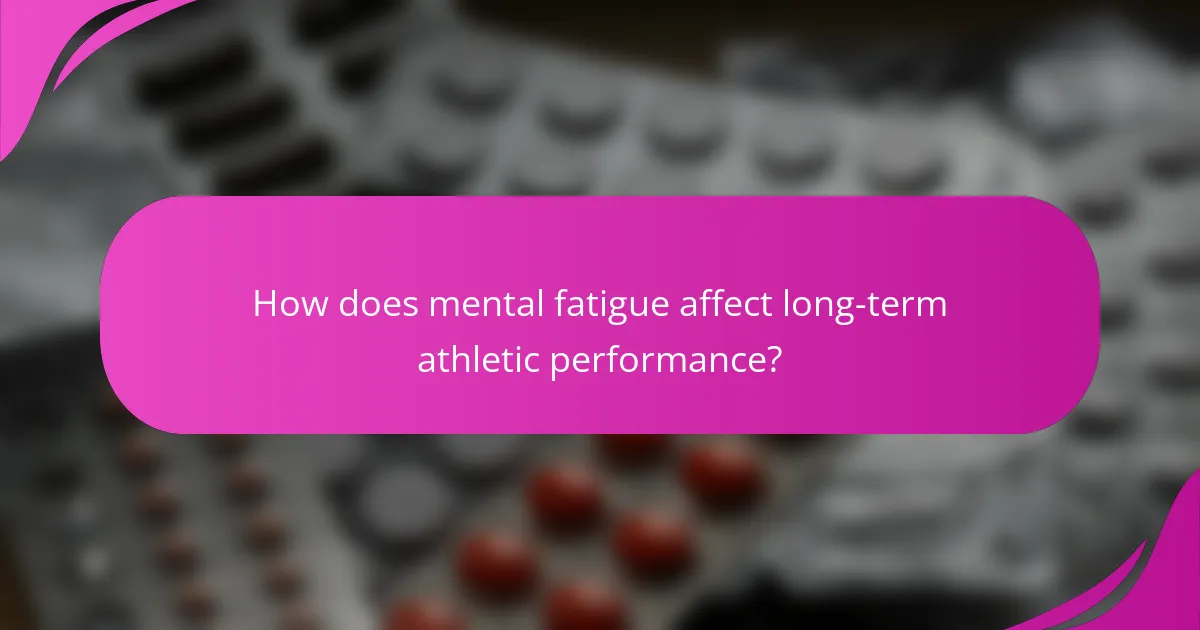
How does mental fatigue affect long-term athletic performance?
Mental fatigue negatively impacts long-term athletic performance by reducing motivation, focus, and recovery rates. Athletes experiencing mental fatigue may struggle with decision-making and physical exertion, leading to suboptimal training outcomes. Research indicates that mental fatigue can impair physical performance by up to 20%, highlighting its significance in athletic recovery. Addressing mental fatigue through strategies like mindfulness and structured rest can enhance overall performance and resilience.
What are the psychological consequences of chronic mental fatigue?
Chronic mental fatigue can lead to significant psychological consequences, including increased anxiety, depression, and cognitive decline. These effects can hinder athletic recovery and performance. Research indicates that prolonged fatigue disrupts emotional regulation and motivation, ultimately impacting overall mental health and athletic success.
How can athletes prevent mental fatigue in the long run?
Athletes can prevent mental fatigue in the long run by incorporating structured recovery strategies. Prioritising sleep, engaging in mindfulness practices, and maintaining a balanced diet are crucial. Regular breaks during training and setting realistic goals help manage stress. Additionally, seeking social support from coaches and peers enhances resilience against mental fatigue.
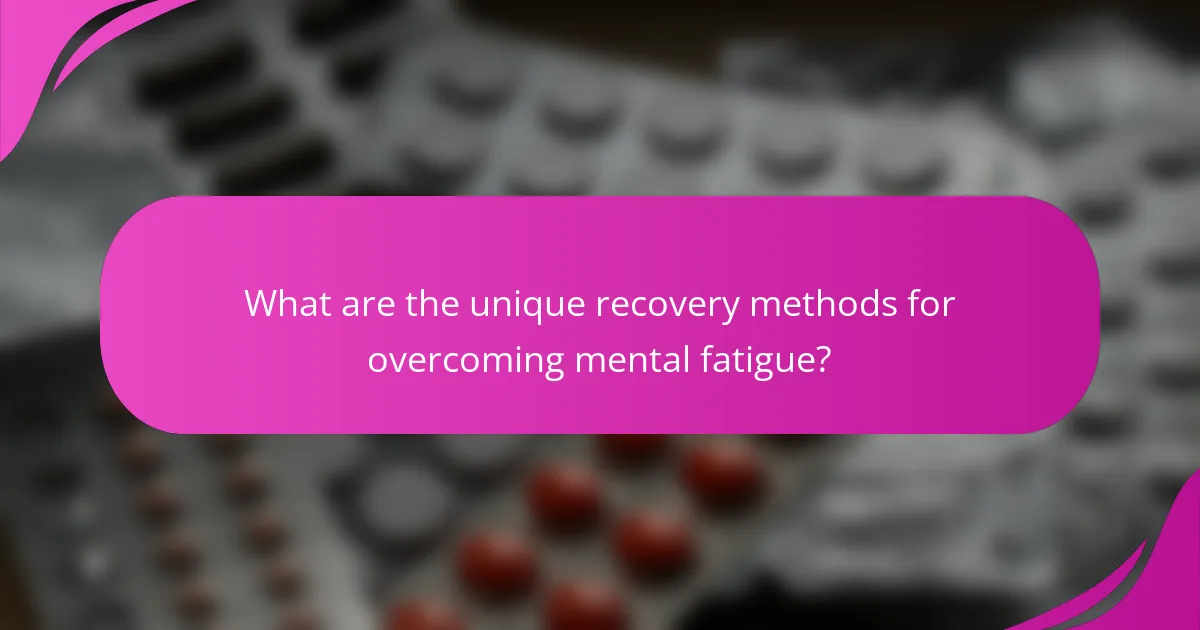
What are the unique recovery methods for overcoming mental fatigue?
To overcome mental fatigue in athletic recovery, unique methods include mindfulness practices, structured rest periods, and cognitive behavioural techniques. Mindfulness reduces stress and enhances focus, while structured rest optimises recovery cycles. Cognitive behavioural techniques address negative thought patterns, promoting resilience in athletes.
How can mindfulness and meditation techniques assist athletes?
Mindfulness and meditation techniques significantly enhance athletes’ mental recovery by reducing stress and improving focus. These methods foster a state of relaxation, which can combat mental fatigue. Research indicates that consistent practice leads to improved performance outcomes and emotional regulation. Athletes who engage in mindfulness report increased resilience and better coping strategies during competition.
What role does sports psychology play in recovery?
Sports psychology plays a crucial role in recovery by addressing mental fatigue and enhancing motivation. Techniques such as visualization, goal-setting, and mindfulness help athletes regain focus and resilience. Research indicates that mental strategies can significantly reduce recovery time and improve performance outcomes. For example, athletes who engage in psychological training report higher levels of confidence and lower levels of anxiety during recovery phases.
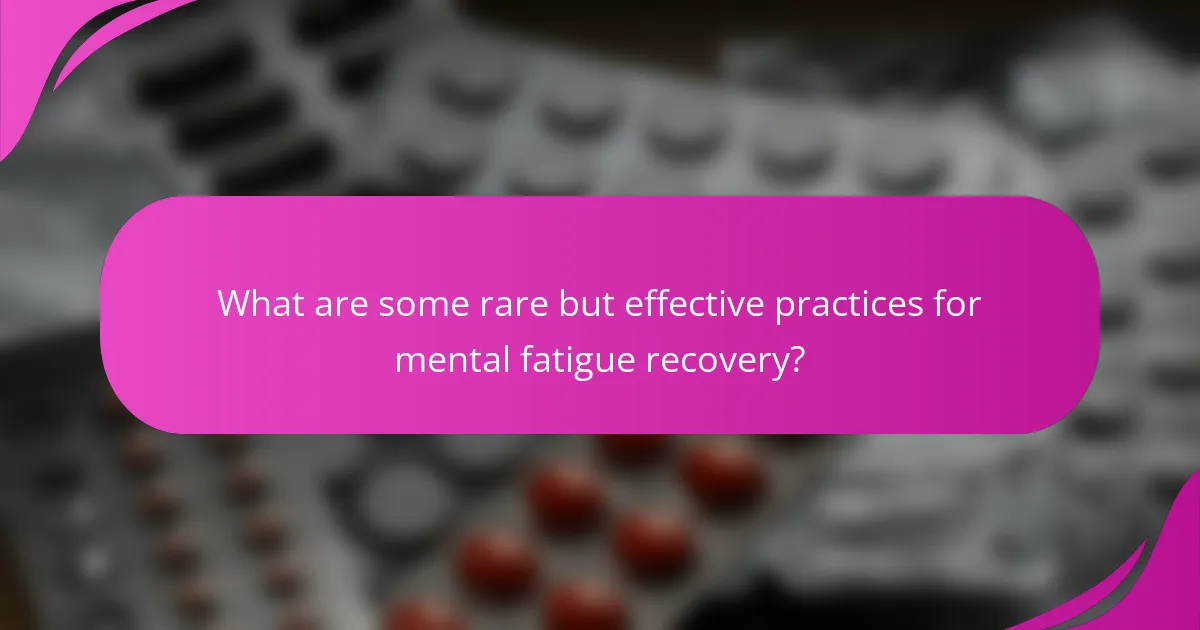
What are some rare but effective practices for mental fatigue recovery?
To recover from mental fatigue, consider practices like mindfulness meditation, nature immersion, and creative expression. These rare methods can significantly enhance mental clarity and emotional resilience. Mindfulness meditation helps focus the mind, nature immersion reduces stress, and creative expression fosters emotional release. Incorporating these strategies into athletic recovery can lead to improved performance and well-being.
How can creative outlets enhance mental recovery for athletes?
Creative outlets significantly enhance mental recovery for athletes by providing emotional expression and stress relief. Engaging in activities like art, music, or writing can alleviate mental fatigue, fostering resilience. Research indicates that creative expression reduces anxiety levels, promoting a positive mindset during recovery. Furthermore, these outlets can serve as a distraction, allowing athletes to focus on something other than their injuries, which can accelerate the healing process. Overall, integrating creative practices into recovery routines can lead to improved mental well-being and a more effective return to sport.
What unconventional therapies are being explored for mental fatigue?
Unconventional therapies for mental fatigue include practices like mindfulness meditation, neurofeedback, and art therapy. These approaches aim to enhance mental recovery and resilience in athletes. Mindfulness meditation reduces stress and improves focus. Neurofeedback trains brain activity for better emotional regulation. Art therapy fosters expression and relaxation, aiding recovery. Each method offers unique benefits, contributing to holistic athletic recovery strategies.
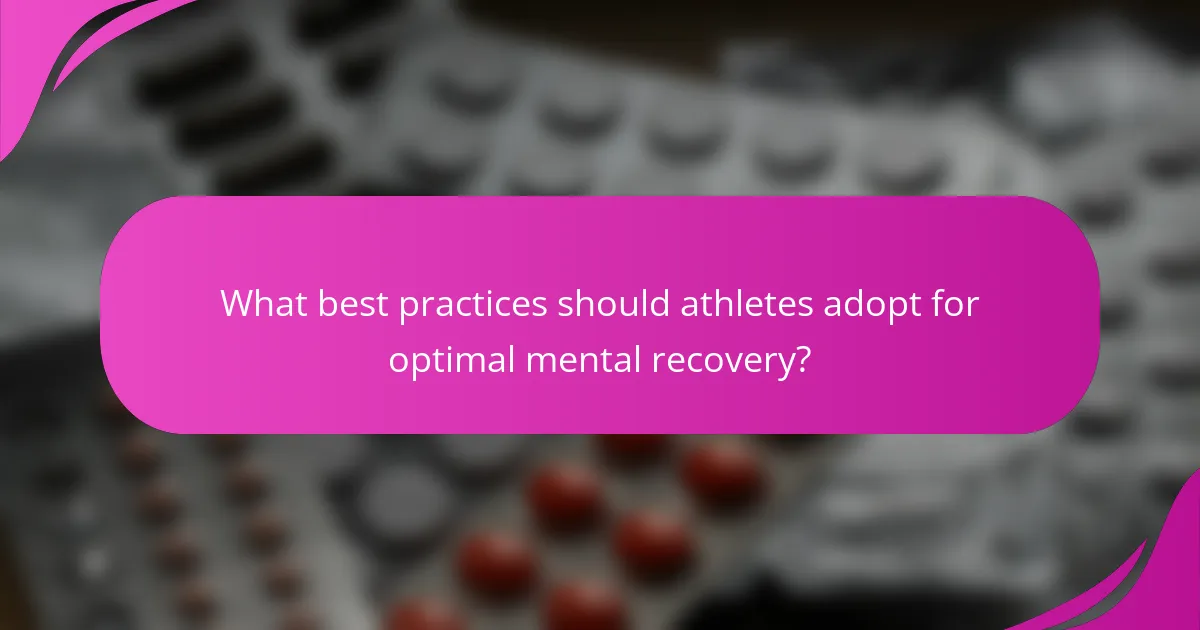
What best practices should athletes adopt for optimal mental recovery?
To optimise mental recovery, athletes should adopt practices like mindfulness, structured rest, and social support. Mindfulness techniques enhance focus and reduce stress, while structured rest periods prevent burnout. Engaging with supportive peers fosters a positive mindset, crucial for overcoming mental fatigue.
How can athletes create a balanced training and recovery schedule?
Athletes can create a balanced training and recovery schedule by prioritising mental health alongside physical conditioning. Establishing specific recovery days, incorporating mindfulness practices, and ensuring adequate sleep are vital strategies.
To enhance recovery, athletes should integrate low-impact activities such as yoga or swimming, which promote relaxation and reduce mental fatigue. Additionally, tracking training intensity and recovery metrics can help in adjusting schedules effectively.
A unique attribute of this approach is the use of psychological techniques, such as visualization, which can significantly improve recovery outcomes. Balancing these elements fosters resilience, ultimately enhancing athletic performance.
What common mistakes should athletes avoid during recovery?
Athletes should avoid neglecting mental health, skipping rest days, ignoring nutrition, and underestimating recovery time. These mistakes can hinder performance and prolong recovery. Prioritising mental well-being is crucial for athletes to overcome fatigue and enhance their recovery process.
What expert insights can guide athletes in managing mental fatigue?
Athletes can manage mental fatigue by incorporating structured recovery techniques and mental resilience strategies. Prioritise rest and sleep, as they are crucial for cognitive recovery. Mindfulness practices, such as meditation and visualization, enhance focus and reduce stress. Setting realistic goals helps maintain motivation and prevents burnout. Engaging in light physical activity can also rejuvenate both body and mind. Lastly, seeking support from coaches or mental health professionals can provide valuable insights and coping mechanisms.